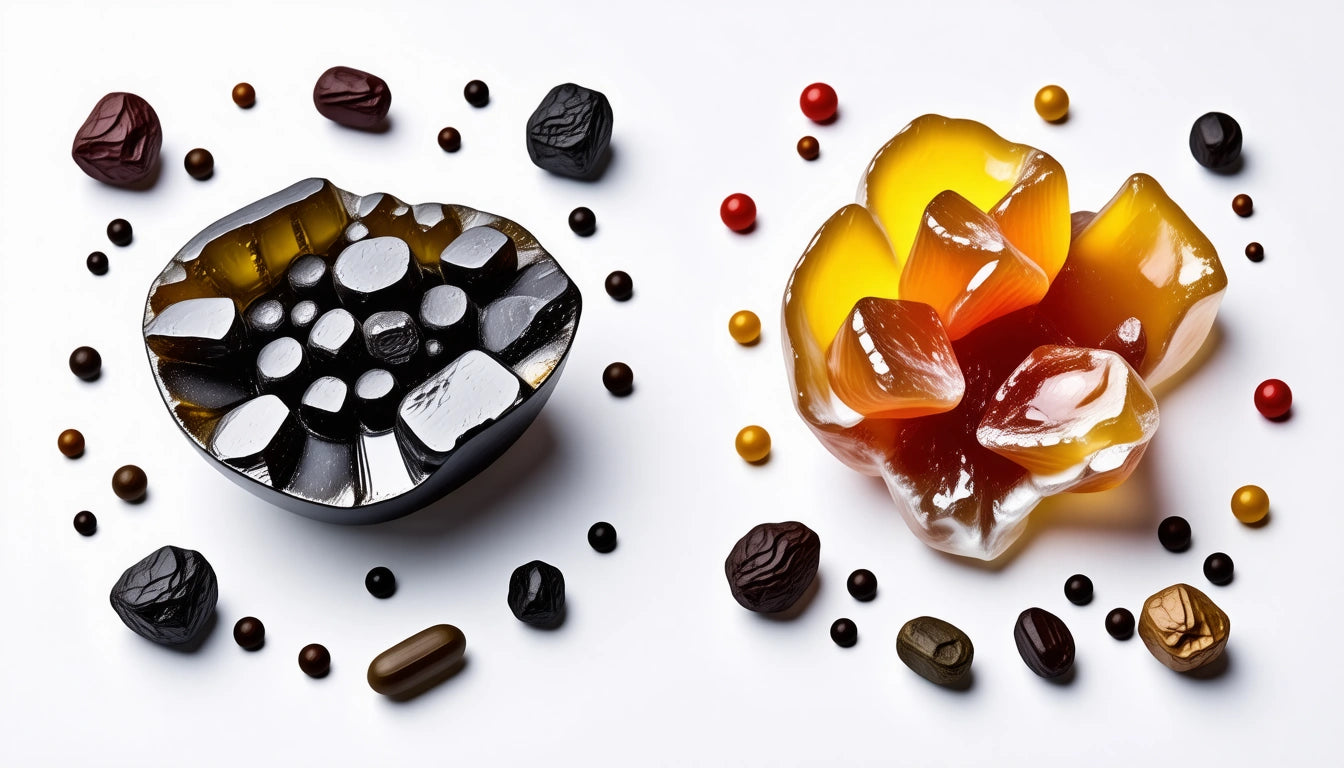Table of Contents
Rosin vs. Wax: Understanding the Differences and Best Uses
Cannabis concentrates have revolutionized consumption methods, offering potent alternatives to traditional flower. Among these, rosin and wax stand out as popular options, each with distinct characteristics. Understanding the differences between wax vs rosin helps consumers make informed decisions based on their preferences, health considerations, and desired effects.
Production Methods: Solventless vs. Solvent-Based Extraction
The fundamental difference between rosin and wax lies in their production methods.
Rosin Production
Rosin is produced through a solventless extraction process that uses only heat and pressure. This method preserves the plant's natural terpene profile while extracting cannabinoids. Making rosin at home is relatively straightforward, requiring only basic equipment like a rosin press or even a hair straightener for small batches.
Wax Production
Cannabis wax, conversely, is created using solvent-based extraction methods. Butane, propane, or CO2 strip cannabinoids and terpenes from plant material. The resulting solution undergoes purging to remove residual solvents, creating a waxy concentrate. This process requires specialized equipment and expertise to ensure safety and product quality.
Potency and Composition: Comparing THC Levels and Terpene Profiles
Both concentrates offer high potency, but their composition differs significantly.
Rosin Potency
Rosin typically contains THC levels between 70-80%, though premium hash rosin can exceed 80%. Its solventless nature preserves a fuller spectrum of cannabinoids and terpenes, delivering an experience closer to the original strain profile. This preservation makes rosin particularly valued for its flavor and entourage effect.
Wax Potency
Wax concentrates generally range from 60-90% THC, depending on the extraction method and starting material. While solvent extraction can achieve higher cannabinoid isolation, it may sacrifice some of the more volatile terpenes during processing. Wax concentrates compared to flower offer significantly higher potency but sometimes at the cost of the full flavor profile.
Flower Rosin vs. Hash Rosin: Key Differences
Within the rosin category, there are important distinctions between flower rosin and hash rosin.
Flower Rosin
Pressed directly from cannabis flower, this type of rosin is more accessible to produce but typically yields lower quantities and potency (60-75% THC). Its flavor profile closely resembles the source strain, making it popular among enthusiasts seeking authentic experiences.
Hash Rosin
Made by pressing bubble hash or dry sift, hash rosin represents the premium tier of solventless extracts. It contains fewer plant materials and higher concentrations of trichomes, resulting in greater potency (75-85%+ THC) and purity. The enhanced filtration process creates a cleaner product with minimal plant matter.
When considering what's better for a hash hole, rosin or diamonds, many connoisseurs prefer hash rosin for its full-spectrum effects and solventless nature, though diamonds offer higher THC percentages for those seeking maximum potency.
Consumption Methods and Equipment
Both concentrates can be consumed in various ways, though some methods work better for each type.
- Dabbing: The most popular method for both concentrates, using a dab rig with a heated surface.
- Vaporizing: Portable wax pens and concentrate vaporizers work well with both products.
- Topping: Both can be added to flower in bowls or joints, though rosin tends to melt more cleanly.
For proper storage and handling of these sticky concentrates, quality containers are essential. Many consumers rely on child-resistant glass jars with secure caps to maintain freshness while ensuring safety, especially in households with children.
Storage Considerations for Preserving Quality
Proper storage significantly impacts the longevity and quality of concentrates.
Rosin Storage
Rosin is particularly sensitive to heat and oxidation. Store it in an airtight, UV-protected glass container in a cool, dark place. For long-term storage, refrigeration is recommended, but allow the container to reach room temperature before opening to prevent condensation.
Wax Storage
Wax concentrates are somewhat more stable but still benefit from proper storage techniques. Silicone containers work for short-term storage, but glass is preferred for longer periods. Like rosin, wax should be kept away from heat, light, and air to preserve its consistency and potency.
Best Applications: When to Choose Rosin or Wax
The choice between wax vs hash or rosin depends on individual priorities:
Choose Rosin When:
- You prefer solventless, chemical-free extracts
- Flavor profile and terpene preservation are priorities
- You're willing to pay premium prices for artisanal quality
- You have concerns about residual solvents
Choose Wax When:
- Budget considerations are important (typically more affordable)
- Maximum THC potency is the primary goal
- You prefer specific consistencies (crumble, budder, etc.)
- You're purchasing from trusted producers with proper testing
For those interested in exploring high-quality source material for homemade extracts, finding the best strains for rosin production can significantly impact your results.
Understanding the fundamental differences between resin and rosin also helps clarify the broader concentrate landscape.
Future of Cannabis Concentrates: Innovation and Market Trends
The concentrate market continues to evolve with technological advancements and shifting consumer preferences. Solventless extracts like rosin are gaining market share as consumers become more health-conscious and knowledgeable. Meanwhile, innovations in solvent extraction are producing cleaner, more refined wax products with improved terpene retention.
As legal markets mature, expect to see more specialized products targeting specific effects, hybrid extraction methods combining the benefits of both approaches, and greater emphasis on strain-specific concentrates that preserve the unique characteristics of premium cannabis varieties.











Leave a comment
All comments are moderated before being published.
This site is protected by hCaptcha and the hCaptcha Privacy Policy and Terms of Service apply.